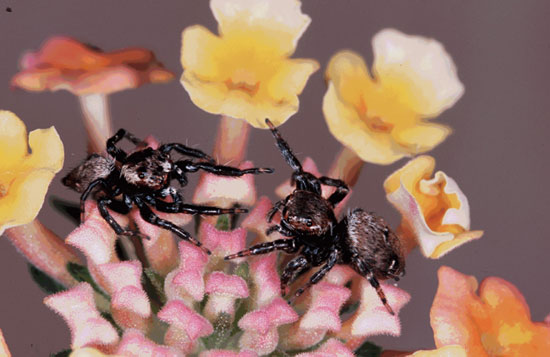Spiders Attracted to Blood Perfume

Get the world’s most fascinating discoveries delivered straight to your inbox.
You are now subscribed
Your newsletter sign-up was successful
Want to add more newsletters?

Delivered Daily
Daily Newsletter
Sign up for the latest discoveries, groundbreaking research and fascinating breakthroughs that impact you and the wider world direct to your inbox.

Once a week
Life's Little Mysteries
Feed your curiosity with an exclusive mystery every week, solved with science and delivered direct to your inbox before it's seen anywhere else.

Once a week
How It Works
Sign up to our free science & technology newsletter for your weekly fix of fascinating articles, quick quizzes, amazing images, and more

Delivered daily
Space.com Newsletter
Breaking space news, the latest updates on rocket launches, skywatching events and more!

Once a month
Watch This Space
Sign up to our monthly entertainment newsletter to keep up with all our coverage of the latest sci-fi and space movies, tv shows, games and books.

Once a week
Night Sky This Week
Discover this week's must-see night sky events, moon phases, and stunning astrophotos. Sign up for our skywatching newsletter and explore the universe with us!
Join the club
Get full access to premium articles, exclusive features and a growing list of member rewards.
Jumping spiders apparently use blood as a perfume to attract the opposite sex.
The jumping spider Evarcha culicivora, which dwells near Lake Victoria, the largest lake in Africa, hungers after mosquitoes engorged with blood. Scientists have even found this 5-millimeter-long spider prefers hunting bloodsuckers infested with the deadly malaria parasite, suggesting these predators could help control the lethal disease.
In dining on bloodsuckers, the jumping spiders — so named because they can leap some 40 times their own body length, which for a 6-foot-tall human would mean 240 feet — are in a roundabout way feeding on blood. It now turns out this vampire-by-proxy diet is sexy for the arachnids.
"In the case of E. culicivora, it seems that the way to a spider's heart is through the other spider's stomach," researcher Fiona Cross, a spider biologist at the University in Christchurch, New Zealand, told LiveScience.
Cross and her colleagues fed spiders of both sexes a variety of meals — blood-fed female mosquitoes, sugar-fed female mosquitoes, male mosquitoes that naturally feed on flower nectar and not blood, and lake flies. The female mosquitoes were fed blood from the researchers — "a tub of mosquitoes was applied to the skin around our tummy," explained researcher Simon Pollard, a spider biologist at Canterbury Museum in Christchurch. (It was the first time the lab-bred mosquitoes had fed on blood, so the researchers didn't run the risk of contracting malaria.)
Spiders that dined on blood-fed mosquitoes were sexier to members of the opposite sex — other spiders spent four times as much time closer to a vent carrying scent gently blown off them. When spiders on non-blood diets were switched to blood-fed mosquitoes, they became more attractive, and the opposite was true when spiders were changed to blood-free diets. The spiders displayed no interest in the scent of blood-fed members of the same sex.
"It's what's inside the prey that makes the spider more attractive," Cross said. "It might be like if we all gave off an odor after eating chocolates. It would only be the people who ate the chocolates with particular centers who smelled particularly attractive. Weird."
Get the world’s most fascinating discoveries delivered straight to your inbox.
While these spiders don't share blood-rich mosquitoes with others, Cross said, a potential mate perhaps "gets benefits that are more indirect, such as having offspring that inherit the ability to catch this unusual prey."
It may be common for animal courtship routines to in part be rooted in the use of diet-based perfumes. There is evidence from research on salamanders and voles, for example, that suggest that the odor of feces from animals on high-quality diets is attractive to potential mates.
As may be the case in human relationships, "Resources often play an important role in whether an animal is accepted as a mate," Cross said. They might reflect the quality of a potential mate's territory, "or the quality of a nuptial gift, usually food, presented during courtship."
Cross added that an important next step is to find out whether spiders on blood diets really are more successful at mating. It would also be interesting to see whether blood diets help lead to more viable eggs or sperm, whether the spiders experience health benefits, and whether there are specific compounds in the blood that are especially sexy.
"There's an awful lot more to learn about this spider," Cross said.
Cross, Pollard and their colleague Robert Jackson detailed their findings online Oct. 26 in the Proceedings of the National Academy of Sciences.
- Monogamous Animals: It's Not What You Think
- Spider News, Images and Information
- Images: Creepy Spiders

 Live Science Plus
Live Science Plus





